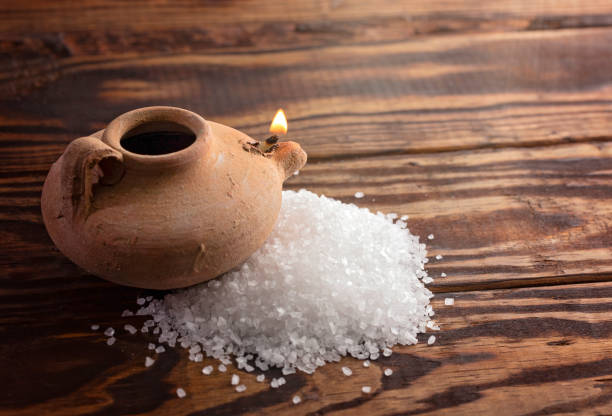
THE FIGURE OF SALT AND LIGHT
HOMILY FOR FIFTH SUNDAY IN ORDINARY TIME, YEAR A. Readings: Isaiah 58:7-10; Psalm 112; 1 Corinthians 2:1-5 and Matthew 5:13-16.
If we recall, two Sundays ago, the liturgy identified Christ as “The light shown to those who sit in darkness and in the shadow of death” (Mt 4:13). In today’s liturgy, Christ the great light presents to us two special imageries to define the Christian life as: salt and light. For the imagery of salt, it is born from two purest parents: salt is born from sun/light and sea/water. From these parents, we see the relationship of salt and light as used in the teachings of Christ on the mount.
The usefulness of salt cannot be overemphasized. It preserves mostly food from deteriorating and also transforms the taste of food; salt purifies: there is a cleansing and healing property in salt. One may have various brands of toothpastes, but a little salt with warm water brings healing to a patient with toothache. Christ telling us “You are the salt of the earth” (Mt 5:13) is invariably telling us that the Christ’s listeners are set apart from other people (Scribes, Pharisees, etc), who are not the salt of the earth. It is plural, and thus describes the Church. He calls us individually and collectively to be the salt of the earth. Salt has little or no influence while sitting in a salt shaker or its container. However, it is of great value once it is mixed, in the right proportion in our food. It transforms the taste of our food. So also, Christians sitting alone in the comfort of their homes are unlikely to make much of a difference to the people outside their door who need Christ. Our lives ought to transform our environment in which we find ourselves, just as salt transforms food, and just as a few grains of salt can make a big difference in food, so also, a few faithful Christians can make a big difference in the world.
As salt has healing and cleansing properties, our presence as Christians should bring healing to people, not pain. Do not be the type of person that when you appear in a gathering, everyone leaves the place for you because you have come with sorrows and pains. Rather, let your presence purify the hearts of people and bring healing to broken hearts around you. As salt is used for preservation, Christ calls us to be the preservatives of this decaying society and in particular, our nation. You and I as Christians must preserve the earth from deteriorating. We must not lose taste as salt, and so, we must be prayerful and practice works of charity.
While salt preserves, purifies and heals the earth, Christ also teaches us that as light of the world, we are to influence the world positively. To begin with, the source of our light is in Christ Jesus, who said, “I am the light of the world. Whoever follows me will not walk in darkness” (Jn. 8:12) and here in the Sermon on the Mount he said to his listeners, “You are the light of the world. A city set on the hill cannot be hidden… Let your light so shine before men, that they may see your good works and give glory to your father who is in heaven” (Mt 5:15-16). By the virtue of our baptism, we are radiance of Christ’s light, so let the light shine. He has appointed us to bring light to dispel the darkness of the world through the witness of our good work, and our light is derived from our relationship with him. Our light is not our own, but the reflection of Christ’ light. The good work here refers to keeping the principles of Christian love. If we love one another, our love will be manifested in acts of mercy. Such acts are highly effective ways to give God glory. Is an act that enables us renders a sacrificial service to others, which in turn, draws them to Christ.
In our practice of good works and charity, the prophet Isaiah in the first reading urges us to “Share your bread with the hungry, and bring the homeless poor into your house; when you see the naked, cover him, and do not hide yourself from your own flesh. Then shall your light break forth like the dawn, and your healing shall spring up speedily” (Is 58:7-8). In this reading, the Israelites were worried that God was not attentive to their prayers; rather they were the ones inattentive to the cries of the needy. In view of this the prophet addresses their false religious observance which is rooted in people who observe spiritual disciplines for selfish reasons while ignoring the plights of others. Furthermore, he said,“If you pour yourself out for the hungry and satisfy the desire of the afflicted, then shall your light rise in the darkness and your gloom be as the noonday” (v.10).
To really appreciate light, one must have stumbled through darkness. Our nation has been and is still in darkness. It appears darkness has covered Nigeria and we barely see clearly. Obviously, we have experienced blind leaders that have led us to this present state of the country. However, there is a spark of hope as today’s psalm puts it, “A light rises in darkness for the upright” (Ps 112:4). We have a good opportunity in this forth coming election to get things right and let light shine again in this country by voting competent and insightful leaders, who are ready to sacrifice for the good of the nation, not leaders that will sacrifice the nation for their own good. Like the salt of the earth, this election period is one of the ways we as Nigerians and as Christians can preserve and transform our nation from decaying in darkness to a nation generating and distributing light. Running away from our country will not solve the problem, except we hold onto the philosophy of “He who fights and run away, lives to fight another day.” However, it is good to note that the ‘another day’ is at hand, and it is the forthcoming election, which we must get right this time around. It is co-responsibility and through our good works and examples, our lives can make others discover Christ and remain with Him.
Happy week of being salt and light to everyone around you.
Blessed Sunday!
Fr. Ken Dogbo, OSJ










